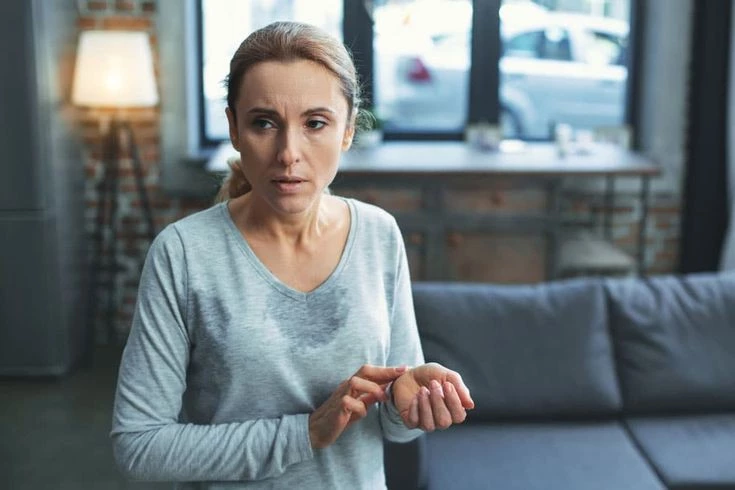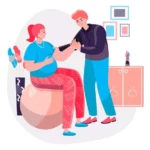OVER VIEW
Contents
Hot flashes and night sweats in Menopause are common symptoms, that occur after the age of 45.
It can last for 7 years, during which the symptoms of this bother them a lot, but a good thing, after this woman gets rid of periods forever, and no pregnancy.
What to do about symptoms like hot flashes and night sweats caused due to this?
There are many natural ways available to manage menopause symptoms.
A Researcher’s team indicates that hot flashes were worse in overall poorer health women.
Here are managing tips for hot flashes and night sweats.

What Are Hot Flashes?
It is one of the most commonly seen symptoms during menopause. which can run uncomfortable for several years.
Hot flashes are a sudden wave of heat over your body or feeling, seen mainly in your neck, face, and chest, causing sweating in the daytime.
According to some evidence, hot flashes can run for an average of 5.2 years, and they can be short-term and long period.
Hot flashes and night sweats occur due to hormonal changes in the body called estrogen and progesterone, which affect the body temperature.
Even doctors also recommend that, before using medicines, try lifestyle changes to manage hot flashes.
Research suggests that African, American, and Hispanic women have had hot flashes for more years, than white and Asian women. And can have different patterns.
Hot flashes suddenly appear and you feel them. that they are coming, with these feelings:
- Fast heartbeat
- Sudden feel warm
- Face getting red
- Sweating on different body parts
What Is Night sweat?
Night sweats or excessive sweating in the daytime is another common symptom seen in menopause.
It can be associated with hot flashes, the body’s reactions to the hormonal changes associated with perimenopause, and menopause.
Night sweats can be caused by some other conditions. such as:
- Alcohol use
- Infections like tuberculosis,
- Cancer
- Low blood sugar
- Medicines side effects
- Hormonal disorders
Hot flashes and sweats that occur during sleep can make it hard to get a good night’s rest.
Ways To Manage Hot Flashes and Night Sweating
Around 75-80% of menopausal women feel irritable because of hot flashes and night sweats or sweat.
It can be a short period to a few minutes of stressful conflict once or twice a day.
Remember, before taking any medicines, try some natural ways or lifestyle changes to minimize menopause symptoms.
Yoga
Researchers also suggest that yoga can reduce hot flashes, (but as a behavioral option), but may not offer any advantage over other types of interventions.
A 2017 study, showed that yoga can effectively relieve physical symptoms such as – hot flashes, night sweats, fatigue, and bladder problems. Cramer said.
Several researchers have reported that pranayama techniques are beneficial in treating a wide range of stress disorders.
Increasing studies suggest that deep breathing, yoga therapy, and relaxation asanas can help in night sweats, and decrease Cardiovascular disease.
Multiple studies have combined the many aspects of Yoga into a general Yoga session to investigate its effects on menopausal symptoms.
Stay Cool
During menopause, it is important to keep yourself cool, which helps in reducing your body temperature and helps in other menopause symptoms.
Stress reduction techniques like meditation and mindfulness, and doing your best to stay cool in general.
You can stay cool in these ways:
- Drinking enough water, keeps you hydrated, and prevents dehydration, which is due to night sweats or excessive sweating.
- Keep your room temperature cool, which also helps you in sleeping, because many women also face difficulty in sleeping, due to sweat, pain, etc.
- Carry a portable fan to use when hot flashes strike.
- Use cooling mattress pads, and pillows – there are many products available that are designed to keep you cool throughout the day.
- Take a cooler morning and night shower, which is excellent even on hot days, that not only relax your muscle but can also boost your mood.
Learn More – Benefits Of Drinking Water On An Empty Stomach In The Morning
Make sure, during menopause years, to stay hydrated, avoid spicy food, and talk to your community women, which may help you in this situation.
Wear Lightweight Clothes
Dress in layers that can be removed at the start of a hot flash (2).
Using natural fabric cloths like cotton, and silks are “better breathing clothes”, that will help her in getting over the heat, and that way she will prevent sweating.
Menopause women should avoid wearing very tight and synthetic garments because these materials trap heat and can increase your body temperature.
Along with light clothes, also keep in mind the kind of food you are eating.
Highly spicy foods can make night sweats, hot flashes, and other symptoms worse.
Try To Maintain a Healthy Weight
Due to hormonal changes in menopause, you might see weight gain around your belly, hips, and thighs. And trying to lose weight might be difficult.
Because stress, various hormonal changes, and aging can work against you.
Maintain a healthy weight, which decreased the risk of bone fracture, diseases, etc. You can maintain your weight in this way. They Include.
- Eat healthy food
- do exercises
- adopt an active lifestyle, which is become more important at this time, because this time you are more prone to the risk of diseases, obesity, etc
Women who are overweight or obese may experience more frequent and severe hot flashes and sweat throughout the day.
Explore Meditation
Some research has shown that hypnotherapy and mindfulness meditation could help with the management of hot flashes, and sweating.
Research in 2011 suggests that mindfulness may reduce women’s experience of hot flashes and night sweats.
If you face too much sweating or heat in the body, hyperacidity, migraine, and anger issues – Seetkari Pranayama will be very helpful.
Also, try Mindfulness meditation, this type of meditation has you focus on what’s happening from moment to moment.
Although not shown to relieve hot flashes, but might reduce how much they bother you.
Eat Soy Product
Soy contains large quantities of phytoestrogens, chemicals that act like estrogen in the body.
Also high in isoflavones, which bind to estrogen receptors. This can help reduce hot flashes.
A 2015 analysis of 10 studies found that plant isoflavones in soy and other sources reduced hot flashes by 11%.
Soy products include:
- Soy milk
- soy nuts
- tofu
- sprouts
- soybeans
- flour
NOTE: Its food forms like tofu and soy milk, are advised. but its tablet and powder are not advised.
Because the amount of isoflavones in supplements or tablets is much higher than those naturally found in soy food.
4. Other Ways To Manage
If hot flashes, night sweats, and other menopause symptoms are bothering you, or interface in your life, Then talk to the doctor about other treatment options.
Hormonal therapy: This is a very effective treatment in relieving hot flashes and sweat.
It is based on estrogen-based hormone therapy, although it has also some downsides.
Medicines – some types of medicines like antidepressants, doctors may prescribe blood pressure medicines.
Take it for the shortest possible time. Other medicines are – anti-epileptic medicine, which usually treats seizures.
Cognitive behavioral therapy – Research in 2014 suggests that CBT can reduce problematic people’s hot flashes and night sweats.
Acupuncture – Mager says that acupuncture can help treat the hormonal imbalance causing heat to rise in the body.
Apart from acupuncture, she advises patients to eat a healthy diet and stay hydrated.
A small study in 2019 observed that 5 weeks of acupuncture reduced hot flashes, night sweats, mood swings, and sleep disruptions symptoms in menopausal women.
Some people find relief from these ways, but some do not, but drugs have possible side effects such as:
- Headache
- difficulty in sleeping
- constipation
- dizziness
Avoid Triggers Things That Make Your Menopause Worse

In each woman hot flashes, night sweats, and other menopause symptoms may be a little different.
You can better manage menopause symptoms if you know what’s triggering your symptoms. Although this cannot prevent hot flashes completely.
Here are common trigger conditions, and foods that you should avoid. Which Include:
Hot Weather or Being in a Hot Room
In India, which is a tropical country, in summer temperature goes up to 45 degrees C, which easily triggered sweat, and hot flashes, especially during making food in the kitchen.
So make sure, to wear lightweight clothes, and switch on the exhaust or open the window during making food.
Drinking Alcohol
Women are more sensitive to the effect of alcohol, than men.
Because women have fewer alcohol dehydrogenase enzymes in the stomach. As a result, their bodies can’t handle alcohol.
According to the research, drinking alcohol increases the risk of disturbance in sleep.
Other studies suggest that moderate drinking may help decrease hot flashes and the risk of heart disease, among other symptoms (3), (4).
Learn More – Alcohol Consumption During Pregnancy.
Caffeine
Researchers found that postmenopausal women who regularly drank caffeinated beverages — such as coffee, tea, or soda, experienced more vasomotor or menopause symptoms.
Another study data, drinking caffeine may worsen your hot flashes and night sweats.
Spicy food
I think this is one of the common reasons that trigger menopause symptoms. And avoiding spicy food is a common recommendation for menopausal women.
Multiple studies prove that eating spicy food is associated with hot flashes and daytime sweating.
Another study found that 717 Indian postmenopausal women experienced hot flashes with increased consumption of spicy food and levels of anxiety.
As well as, eating highly salted food is linked to lower bone density in postmenopausal women.
In some women, it may trigger with some other foods such as:
- High sugar
- salty foods
- fatty meats
- processed food
Learn more – Reasons For Excessive Sweating?
Feeling stressed
During this period, many women experienced stress, anxiety, and depression. This is due to physical changes in the body such as decreasing levels of estrogen and progesterone.
So make sure, to do regular exercise, mindfulness meditation, yoga, eat a healthy diet, get adequate sleep, and avoid triggering things.
Smoking
Women who smoke are more likely to be prone to see menopause symptoms, compared to nonsmokers women.
Also smoking leads to irregular or painful periods, mood swings, irritability even in small things, night sweats, hot flashes, etc.
Smoking whether it is active or passive – means Either you are smoking or someone else you are inhaling, which also affects your symptoms.
Former and current cigarette smoker has increased odds of experiencing hot flashes compared to never smokers.
Other Trigger Things
- Wearing tight cloths
- Bending over
- Radiation therapy and chemotherapy in cancer treatment may also cause hot flashes and night sweats
- Some prescribed medicines’ side effects
BOTTOM LINE
Menopause can last for 7 years, during which the symptoms of this bother them a lot, but a good thing, after this woman gets rid of periods forever and has no pregnancy.
Hot flashes, which are associated with night sweats are one of the most commonly seen symptoms during menopause.
It is important to keep yourself cool, with water, by carrying a portable fan, and shower, which helps in reducing your body temperature.




